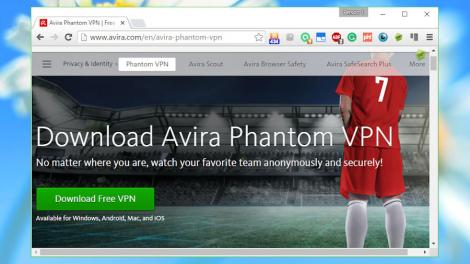

Every internet security company offers some form of privacy protection – ad-blocking, anti-tracker, secure browsing – but Avira takes this to the next level with its own VPN product.
Avira Phantom VPN is aimed very much at the home user. There’s no complexity, no choice or even mention of technical details such as protocols, and you only get 13 servers to choose from.
The pricing structure is equally stripped back – it’s just one product at what seems an expensive £51.99 ($68, AU$91) per month.
There is a free account, too. The base version has a crippling 500MB/month data cap (plus you get a four or five minute grace period before disconnection), but it doesn’t require registration or an email address: just download, install and connect. You won’t be able to stream anything, but for occasional low-bandwidth use, perhaps while travelling, it might be enough.
Avira’s no-registration free account is a good starting point, but once you upgrade the company requires all the usual details: physical and email address, credit card, PayPal or banking information (wire transfer or SOFORT banking).
As the free account has a data cap, it may log your originating IP address, and maybe connection times. The company doesn’t make this clear, although Avira does say that it doesn’t monitor the content of your traffic, or log the sites you visit.
Any data collected is normally held on servers within the European Union. As usual, the small print has a get-out clause or two, including the possibility that data may be backed up to a server in the US, but overall your activities are still more protected than with most of the competition.
The news gets even better when you’re browsing, as Avira Phantom VPN passed all our leak tests, including DNS (the product has its own server-side DNS).
Avira Phantom VPN covers all the main OS bases, with clients available for Windows, Android, Mac and iOS.
Installation requires some care as by default the program will install Avira System Speedup, SafeSearch Plus, Software Updater and Online Essentials Dashboard. But keep hitting ‘skip’ and the offers eventually disappear, and you’re left with the VPN client only.
Basic operations are as easy as hitting a single button to connect or disconnect.
You’re able to choose your preferred country from the Settings dialog, or set the program to launch when Windows starts, but that’s about it. Apart from a single unexpected "Send diagnostic data" setting, anyway – we don’t know exactly what it does, but for privacy it’s probably best to turn it off.
If you do have any problems, there’s little in the way of immediate online help, and the advice we saw seemed quite basic.
Actual VPN performance is difficult to measure as there are so many variables, but as well as general testing (browsing, streaming video), we also used speedtest.net to measure the latency, upload and download speeds, and then tested immediately again with the VPN turned off, to measure any difference (over several rounds of testing).
Fortunately Avira Phantom VPN proved very reliable in our tests, connecting without issue whenever we needed it. Performance was also consistent and a little above average in comparison to other VPN services we’ve tried – latency was only up by 36%, download speeds reduced by 17% on our standard speeds, and uploads were down 32%.
Avira Phantom VPN’s commercial package is a little overpriced for what you get, but if you’re an Avira fan or can live within the limits of the free plan then it might be worth a look.
Source: Tech Radar